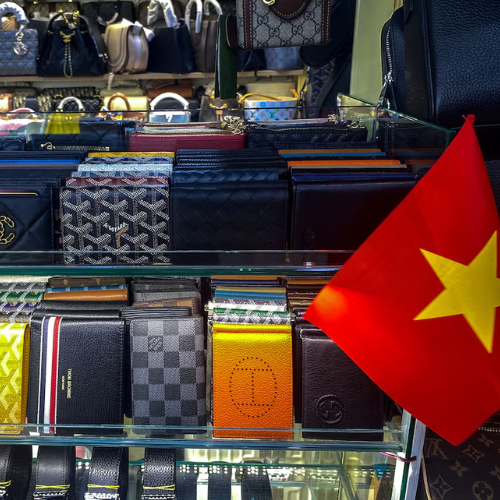Vietnam has recently ramped up its efforts to combat counterfeit goods following accusations from the United States, which has labeled the country a major hub for fake products and digital piracy. In response, they are intensifying inspections of imported goods to prevent counterfeit products from entering the market. These measures come as the U.S. has warned Vietnam that it could face heavy tariffs on its exports if the counterfeit issue is not addressed. The Vietnamese government is taking steps to avoid these penalties by ensuring stricter enforcement of intellectual property protection.
Increased Inspections on Luxury Goods and Electronics
One of the primary targets of Vietnam’s crackdown is luxury goods. Products from top brands like Prada, Gucci, and Samsung are now subject to more thorough checks at the country’s borders. These goods are being inspected carefully to ensure they are genuine and not counterfeit.
In addition to luxury items, electronics from companies such as Google and Samsung, as well as toys from brands like Mattel and Lego, are also being closely monitored. Even everyday consumer goods, such as shampoos and razors from Procter & Gamble and Johnson & Johnson, are under review. The government aims to prevent counterfeit goods from entering the market, ensuring consumer safety and protecting businesses from fraudulent products.
Tense Crossroads: Vietnam Vows Crackdown After U.S. Finds China Label Trickery
Focus on Imported Fakes and Digital Piracy
Vietnam’s crackdown primarily targets counterfeit goods coming from other countries, not those produced within the country. Although the U.S. has raised concerns about Vietnam’s role in producing counterfeit items, the focus of the current measures is on imported fakes. Authorities are especially concerned with preventing the entry of fake luxury goods and electronics into the country.
The issue extends beyond physical goods. Vietnam is also addressing the growing problem of counterfeit software. The Ministry of Culture has issued warnings to local companies about the illegal use of software, which can lead to security risks and disrupt business operations. The Business Software Alliance, an organization that includes companies like Microsoft and Adobe, has been pushing for stronger enforcement against the unauthorized use of software in Vietnam.
Pressure from the United States and Online Counterfeits
The intensified crackdown is part of Vietnam’s strategy to avoid heavy tariffs from the United States. The U.S. has warned that if these tariffs are imposed, Vietnamese exports to the U.S. could face duties of up to 46%. The U.S. is pushing for better protection of intellectual property, which includes taking stronger action against counterfeits and digital piracy. This issue is a central point of negotiation in ongoing trade talks between the two countries.
Vietnam Seeks Trade Solutions as U.S. 46% Tariffs Approach
In addition to physical goods, the online sale of counterfeit products remains a significant concern. E-commerce platforms such as Shopee, which operates in Vietnam, have been identified as major venues for the sale of counterfeit goods. Despite the efforts to curb these illegal sales, counterfeit products are still being sold online. This has drawn criticism from the U.S., which has urged Vietnam to address this issue more effectively.
Tensions with China and Special Courts for Intellectual Property
Vietnam’s actions to curb counterfeiting are also putting its relationship with China under strain. China is the main source of many counterfeit goods, and measures targeting counterfeit imports could affect trade with its neighbor. However, their primary goal is to meet U.S. demands and avoid the tariffs that could harm its economy.
To strengthen its intellectual property protection, Vietnam is also planning to establish special courts focused on counterfeiting and copyright cases. These courts will play a key role in ensuring that intellectual property rights are respected and that counterfeiters face legal consequences. The creation of these specialized courts is seen as a step toward attracting foreign investment by demonstrating Vietnam’s commitment to intellectual property enforcement.
Despite the government’s increased efforts, including tighter inspections and plans for specialized courts, challenges remain. The pressure from the U.S. continues, and counterfeit products, both physical and digital, still present significant problems. However, Vietnam’s actions show that it is taking the issue seriously and working to address it in order to avoid economic consequences from the U.S.


